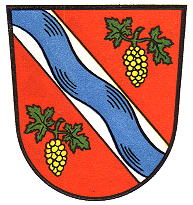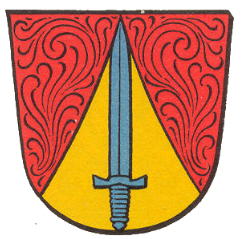Dietzenbach: Difference between revisions
Jump to navigation
Jump to search
Knorrepoes (talk | contribs) No edit summary |
Knorrepoes (talk | contribs) m (Text replace - "[[Literature" to "{{media}} [[Literature") |
||
| Line 17: | Line 17: | ||
Previously, in 1956 another arms were proposed, showing a sword cutting a cloak, symbolised by a golden point in red. St. Martin is often represented as a knight on a horse, cutting his cloak with his sword for a beggar walking beside him; hence the proposal :<br/> | Previously, in 1956 another arms were proposed, showing a sword cutting a cloak, symbolised by a golden point in red. St. Martin is often represented as a knight on a horse, cutting his cloak with his sword for a beggar walking beside him; hence the proposal :<br/> | ||
[[FIle:dietzenbach.jpg|center]] | [[FIle:dietzenbach.jpg|center]] | ||
{{media}} | |||
[[Literature]] : Stadler, 1964-1971, 8 volumes; Hessisches Wappenbuch, 1956 | [[Literature]] : Stadler, 1964-1971, 8 volumes; Hessisches Wappenbuch, 1956 | ||
Revision as of 20:34, 8 July 2014
| Heraldry of the World Civic heraldry of Germany - Deutsche Wappen (Gemeindewappen/Kreiswappen) |
DIETZENBACH
State : Hessen
District (Kreis) : Offenbach
Origin/meaning
The arms were granted and devised in 1957. The old seal of Dietzenbach only showed the patron saint, St. Martin. The wave is a canting symbol (Bach=brook), the grapes symbolise the extensive wine-growing in the area.
Previously, in 1956 another arms were proposed, showing a sword cutting a cloak, symbolised by a golden point in red. St. Martin is often represented as a knight on a horse, cutting his cloak with his sword for a beggar walking beside him; hence the proposal :
Contact and Support
Partners:
Your logo here ?
Contact us
© since 1995, Heraldry of the World, Ralf Hartemink 
Index of the site
Literature : Stadler, 1964-1971, 8 volumes; Hessisches Wappenbuch, 1956












